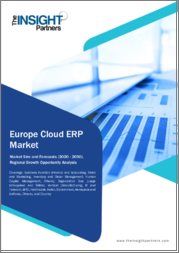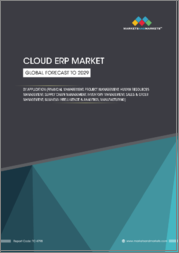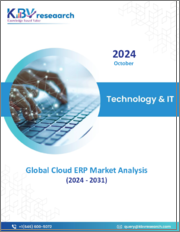
|
시장보고서
상품코드
1510639
유럽의 클라우드 ERP 시장 예측과 지역별 분석 - 업무 기능별, 조직 규모별, 업계별, 국가별(-2030년)Europe Cloud ERP Market Forecast to 2030 - Regional Analysis - by Business Function, Organization Size, and Vertical |
||||||
유럽의 클라우드 ERP 시장은 2022년 78억 1,705만 달러에서 2030년에는 309억 9,120만 달러로 성장할 것으로 예측됩니다. 2022-2030년간 CAGR은 18.8%로 추정됩니다.
다양한 업종에서 클라우드 ERP 솔루션의 채용이 증가, 유럽의 클라우드 ERP 시장을 뒷받침
클라우드 ERP 솔루션의 채택은 특정 산업에 국한되지 않으며, 제조업, 소매업, 의료, 금융, 정부, 교육 등 다양한 산업에서 적용됩니다. 이러한 각 산업은 업무 효율성, 비용 절감, 경쟁력 확보에 있어서 클라우드 ERP의 가치를 인식하고 있습니다. 제조업에서는 생산 공정의 합리화, 재고 관리의 효율화, 공급망의 가시성 향상을 위해 클라우드 ERP를 채용하고 있습니다. 클라우드 기반 ERP 시스템을 통해 생산, 수요 및 재고 수준을 실시간으로 모니터링할 수 있어 리드 타임을 단축하고 비용을 절감할 수 있습니다. 여러 매장을 배포하는 소매 체인은 클라우드 ERP를 도입하여 업무 중앙화, 상점 간 재고 관리 및 공급망 최적화를 실현합니다. 이를 통해 재고 회전 속도를 높이고 배송 비용을 줄이고 고객의 쇼핑 경험을 향상시킬 수 있습니다. 병원 및 클리닉과 같은 건강 관리 제공업체는 클라우드 ERP를 도입하여 환자 관리, 전자 의료 기록(EHR) 및 청구 프로세스를 강화합니다. 또한 클라우드 ERP 시스템은 병원 및 클리닉 데이터 정확도, 환자 관리 및 수익주기 관리 개선에도 도움이 됩니다. 금융 서비스 기업은 클라우드 ERP를 통합하여 회계, 급여 계산, 컴플라이언스 등의 재무 업무를 자동화 및 합리화하여 재무 보고, 규제 준수 및 비용 관리를 개선합니다.
두 업종 모두 클라우드 ERP 채용은 비즈니스 효율성, 효율성, 데이터 가시성 향상, 운영 비용 절감, 고객 경험 향상 등의 요구에 따라 추진되고 있습니다. 클라우드 ERP 시스템은 이러한 요구 사항을 충족하는 데 필요한 유연성, 확장성 및 접근성을 제공하므로 광범위한 기업과 조직에 더욱 매력적이 되고 있습니다. 이에 따라 다양한 업종에서 클라우드 ERP 솔루션의 채용이 진행되고 있으며, 클라우드 ERP 시장은 크게 성장하고 있습니다.
유럽 클라우드 ERP 시장 개요
유럽의 클라우드 ERP 시장은 독일, 프랑스, 이탈리아, 영국, 러시아 및 기타 유럽으로 구분됩니다. 유럽에서는 중소기업이 증가하고 있으며 클라우드 ERP 시장의 보급을 가속화하고 있습니다. 클라우드 ERP는 기간 업무 프로세스의 최적화를 제공합니다. 예를 들어, 2021년 12월, 프랑스 Forterro의 ERP 솔루션인 Sylob은 유럽의 중소기업에 확장 가능한 클라우드 ERP를 제공했습니다. Portworx에 의한 Sylob의 클라우드 변혁은 고객의 신뢰를 높이고 성장의 원동력이 되었습니다. 클라우드 솔루션이 매출에서 차지하는 비율은 2019년에는 14%, 2020년에는 28%, 2021년에는 51%로 거의 두 배로 늘어났습니다. 이와 같이 ERP 클라우드 매출이 시장 확대의 원동력이 될 것으로 예상됩니다.
식품 섹터의 디지털화는 유럽 기관의 정치 과제에서 전략적 우선 순위입니다. 클라우드 ERP는 새로운 기술이 통합되어 제공하는 부서의 경쟁력과 효율성을 향상시키는 데 도움이 될 것입니다. 이러한 개발은 유럽에서 클라우드 ERP의 채택을 뒷받침하고 있습니다. 다양한 클라우드 ERP 소프트웨어 시장의 기업들이 유럽에서 클라우드 ERP의 존재를 확대했습니다. 예를 들어, 2019년 11월, 미션 크리티컬 기업 소프트웨어 솔루션의 세계 공급업체인 Aptean은 식품 기업을 위한 풀 서비스 ERP 공급자인 네덜란드의 Schouw Informatisering 인수를 발표했습니다. Schouw Informatisering 인수는 식품 전문 ERP에 대한 Aptean의 최신 투자로 제공 서비스, 클라우드 기능 및 지리적 도달 범위를 확대합니다. 이 인수는 또한 Schouw Informatisering의 현지 시장에서 주도적 지위를 강화합니다. 이러한 확대는 유럽에서 클라우드 ERP 시장의 보급을 뒷받침하고 있습니다.
유럽 클라우드 ERP 시장 수익과 2030년까지 예측(금액)
유럽 클라우드 ERP 시장 세분화
유럽의 클라우드 ERP 시장은 업무 기능, 조직 규모, 업종별, 국가별로 구분됩니다.
비즈니스 기능에 따라 유럽의 클라우드 ERP 시장은 재무, 회계, 판매 및 마케팅, 재고 및 주문 관리, 인적 자본 관리 등으로 구분됩니다. 2022년 유럽 클라우드 ERP 시장에서는 재무 및 회계 분야가 가장 큰 점유율을 차지하고 있습니다.
조직 규모에서 유럽 클라우드 ERP 시장은 대기업과 중소기업으로 이분됩니다. 2022년 유럽 클라우드 ERP 시장에서는 대기업 부문이 큰 점유율을 차지하고 있습니다.
업계별로 유럽의 클라우드 ERP 시장은 제조업, IT 및 통신, 은행/금융서비스/보험(BFSI), 헬스케어, 소매, 정부, 항공우주 및 방위 등으로 구분됩니다. 2022년 유럽 클라우드 ERP 시장에서는 제조 부문이 가장 큰 점유율을 차지합니다.
국가별로 볼 때 유럽 클라우드 ERP 시장은 독일, 프랑스, 이탈리아, 영국, 러시아 및 기타 유럽으로 구분됩니다. 2022년 유럽 클라우드 ERP 시장은 독일이 독점하고 있습니다.
ACUMATICA, INC, Epicor Software Corp, Infor Inc, Microsoft Corp, Oracle Corp, Sage Group Plc, SAP SE, SYSPRO Proprietary Ltd, Unit4Group Holding BV, Workday Inc는 유럽 클라우드 ERP 시장에서 사업을 전개하는 주요 기업 일부입니다.
목차
목차
제1장 서론
제2장 주요 요약
- 주요 인사이트
- 시장의 매력
제3장 조사 방법
- 조사 범위
- 2차 조사
- 1차 조사
제4장 유럽 클라우드 ERP 시장 상황
- 생태계 분석
- 밸류체인의 벤더 일람
제5장 유럽 클라우드 ERP 시장 : 주요 산업역학
- 성장 촉진요인
- 직원의 생산성과 효율성 향상에 대한 조직 요구 증가
- 업계별 클라우드 ERP 솔루션 도입 증가
- 억제요인
- SaaS ERP 솔루션의 커스터마이즈 옵션이 한정됨
- 보안 침해의 가능성
- 기회
- 중소기업의 디지털화를 위한 정부의 대처 증가
- 모바일 및 클라우드 애플리케이션 사용
- 동향
- 기술의 발전
- 2계층 ERP 시스템 도입 확대
- 성장 촉진요인과 억제요인의 영향
제6장 클라우드 ERP 시장 : 유럽 시장 분석
- 유럽의 클라우드 ERP 시장 매출액, 2022-2030년
- 유럽의 클라우드 ERP 시장 예측 및 분석
제7장 유럽의 클라우드 ERP 시장 분석 : 업무 기능별
- 재무 및 회계
- 재무 및 회계 시장의 수익과 2030년까지의 예측
- 영업·마케팅
- 판매 및 마케팅 시장의 수익과 2030년까지의 예측
- 재고 및 수주 관리
- 재고·수주 관리 시장의 수익과 2030년까지의 예측
- 인적 자본 관리
- 인적자본관리시장의 수익과 2030년까지의 예측
- 기타
- 기타 개요
- 기타 시장의 수익과 2030년까지의 예측
제8장 유럽의 클라우드 ERP 시장 분석 : 조직 규모별
- 대기업
- 대기업 시장의 수익과 2030년까지의 예측
- 중소기업
- 중소기업 시장의 수익과 2030년까지의 예측
제9장 유럽의 클라우드 ERP 시장 분석 : 업계별
- 제조업
- 제조업 시장의 수익과 2030년까지의 예측
- IT 및 통신
- IT 및 통신 시장의 수익과 2030년까지의 예측
- BFSI
- BFSI 시장의 수익과 2030년까지의 예측
- 헬스케어
- 헬스케어의 개요
- 헬스케어 시장의 수익과 2030년까지의 예측
- 소매
- 소매 시장의 수익과 2030년까지의 예측
- 정부기관
- 관공청 시장의 수익과 2030년까지의 예측
- 항공우주 및 방위
- 항공우주 및 방위시장의 수익과 2030년까지의 예측
- 기타
- 기타 개요
- 기타 시장의 수익과 2030년까지의 예측
제10장 유럽 클라우드 ERP 시장 : 국가별 분석
- 유럽
- 프랑스
- 독일
- 영국
- 이탈리아
- 러시아
- 기타 유럽
제11장 업계 정세
- 시장 이니셔티브
- 제품 개발
- 합병과 인수
제12장 기업 프로파일
- ACUMATICA, INC
- Infor Inc
- Microsoft Corp
- Oracle Corp
- Sage Group Plc
- SAP SE
- Workday Inc
- SYSPRO Proprietary Ltd
- Epicor Software Corp
- Unit4Group Holding BV
제13장 부록
JHS 24.07.24The Europe cloud ERP market is expected to grow from US$ 7,817.05 million in 2022 to US$ 30,991.20 million by 2030. It is estimated to register a CAGR of 18.8% from 2022 to 2030.
Rising Adoption of Cloud ERP Solutions Across Various Verticals Fuels Europe Cloud ERP Market
The adoption of cloud ERP solutions is not limited to any one industry; they find applications in a range of verticals, including manufacturing, retail, healthcare, finance, government, and education. Each of these industries recognizes the value of cloud ERP in streamlining operations, reducing costs, and gaining a competitive edge. In a manufacturing company, cloud ERP is adopted to streamline production processes, manage inventory more efficiently, and improve supply chain visibility. A cloud-based ERP system allows real-time monitoring of production, demand, and inventory levels, leading to reduced lead times and cost savings. A retail chain with multiple locations implements cloud ERP to centralize its operations, manage inventory across stores, and optimize its supply chain. This leads to improved inventory turnover, reduced carrying costs, and a better shopping experience for customers. A healthcare provider, such as a hospital or a clinic, adopts cloud ERP to enhance patient management, electronic health records (EHR), and billing processes. The cloud ERP system also helps hospitals and clinics improve data accuracy, patient care, and revenue cycle management. A financial services firm integrates cloud ERP to automate and streamline financial operations, including accounting, payroll, and compliance, leading to better financial reporting, regulatory compliance, and cost control.
In each of these verticals, the adoption of cloud ERP is driven by the need for streamlined and efficient operations, improved data visibility, low operational costs, and enhanced customer or constituent experiences. Cloud ERP systems offer the flexibility, scalability, and accessibility needed to address these requirements, making them increasingly attractive to a wide range of businesses and organizations. Therefore, with the increasing adoption of cloud ERP solutions across various verticals, the cloud ERP market is growing significantly.
Europe Cloud ERP Market Overview
The Europe cloud ERP market is segmented into Germany, France, Italy, the UK, Russia, and the Rest of Europe. The increasing number of small and medium businesses in Europe is helping to accelerate the adoption of the cloud ERP market. Cloud ERP provides the optimization of core business processes. For instance, in December 2021, Sylob, an ERP solution from Forterro France, brought scalable cloud ERP to Europe's small and medium businesses. Sylob's cloud transformation with Portworx helped increase customer trust and drive growth. Cloud solutions accounted for 14% of revenue in 2019, doubled to 28% in 2020, and nearly doubled to 51% in 2021. Thus, the rising sales of the ERP cloud are expected to fuel the market expansion.
The digitization of the food sector is a strategic priority in the political agenda of European institutions. Cloud ERP will help to improve the competitiveness and efficiency of the sector offered by new technologies come together. Such type of development is helping to boost cloud ERP adoption in Europe. Various cloud ERP software market players expanded their cloud ERP presence in Europe. For instance, in November 2019, Aptean, a global provider of mission-critical enterprise software solutions, announced the acquisition of Netherlands-based Schouw Informatisering, a full-service ERP provider for food companies. The acquisition of Schouw Informatisering is Aptean's latest investment in food-focused ERPs, expanding their offerings, cloud capabilities, and geographic reach. The acquisition will also strengthen Schouw Informatisering's leading position in the local market. This type of expansion is helping to boost the adoption of the cloud ERP market in Europe.
Europe Cloud ERP Market Revenue and Forecast to 2030 (US$ Million)
Europe Cloud ERP Market Segmentation
The Europe cloud ERP market is segmented into business function, organization size, vertical, and country.
Based on business function, the Europe cloud ERP market is segmented into finance and accounting, sales and marketing, inventory and order management, human capital management, and others. The finance and accounting segment held the largest share of the Europe cloud ERP market in 2022.
In terms of organization size, the Europe cloud ERP market is bifurcated into large enterprises and SMEs. The large enterprises segment held a larger share of the Europe cloud ERP market in 2022.
By vertical, the Europe cloud ERP market is segmented into manufacturing, IT and telecom, BFSI, healthcare, retail, government, aerospace and defense, and others. The manufacturing segment held the largest share of the Europe cloud ERP market in 2022.
Based on country, the Europe cloud ERP market is segmented into Germany, France, Italy, the UK, Russia, and the Rest of Europe. Germany dominated the Europe cloud ERP market in 2022.
ACUMATICA, INC; Epicor Software Corp; Infor Inc; Microsoft Corp; Oracle Corp; Sage Group Plc; SAP SE; SYSPRO Proprietary Ltd; Unit4 Group Holding BV; and Workday Inc are some of the leading companies operating in the Europe cloud ERP market.
Table Of Contents
Table of Content
1. Introduction
- 1.1 The Insight Partners Research Report Guidance
- 1.2 Market Segmentation
2. Executive Summary
- 2.1 Key Insights
- 2.2 Market Attractiveness
3. Research Methodology
- 3.1 Coverage
- 3.2 Secondary Research
- 3.3 Primary Research
4. Europe Cloud ERP Market Landscape
- 4.1 Overview
- 4.2 Ecosystem Analysis
- 4.2.1 List of Vendors in the Value Chain:
5. Europe Cloud ERP Market - Key Industry Dynamics
- 5.1 Drivers
- 5.1.1 Increasing Organizational Needs to Improve Staff Productivity and Efficiency
- 5.1.2 Rising Adoption of Cloud ERP Solutions Across Various Verticals
- 5.2 Restraints
- 5.2.1 Availability of Limited Customized Options for SaaS ERP Solutions
- 5.2.2 Possibility of Security Breach Issues
- 5.3 Opportunity
- 5.3.1 Increasing Government Initiatives for Digitalization of SMEs
- 5.3.2 Use of Mobile and Cloud Applications
- 5.4 Trends
- 5.4.1 Technological Advancements
- 5.4.2 Growing Implementation of Two-Tier ERP Systems
- 5.5 Impact of Drivers and Restraints:
6. Cloud ERP Market - Europe Market Analysis
- 6.1 Europe Cloud ERP Market Revenue (US$ Million), 2022 - 2030
- 6.2 Europe Cloud ERP Market Forecast and Analysis
7. Europe Cloud ERP Market Analysis - Business Function
- 7.1 Finance and Accounting
- 7.1.1 Overview
- 7.1.2 Finance and Accounting Market Revenue and Forecasts to 2030 (US$ Million)
- 7.2 Sales and Marketing
- 7.2.1 Overview
- 7.2.2 Sales and Marketing Market Revenue and Forecasts to 2030 (US$ Million)
- 7.3 Inventory and Order Management
- 7.3.1 Overview
- 7.3.2 Inventory and Order Management Market Revenue and Forecasts to 2030 (US$ Million)
- 7.4 Human Capital Management
- 7.4.1 Overview
- 7.4.2 Human Capital Management Market Revenue and Forecasts to 2030 (US$ Million)
- 7.5 Others
- 7.5.1 Overview
- 7.5.2 Others Market Revenue and Forecasts to 2030 (US$ Million)
8. Europe Cloud ERP Market Analysis - Organization Size
- 8.1 Large Enterprises
- 8.1.1 Overview
- 8.1.2 Large Enterprises Market Revenue and Forecasts to 2030 (US$ Million)
- 8.2 SMEs
- 8.2.1 Overview
- 8.2.2 SMEs Market Revenue and Forecasts to 2030 (US$ Million)
9. Europe Cloud ERP Market Analysis - Vertical
- 9.1 Manufacturing
- 9.1.1 Overview
- 9.1.2 Manufacturing Market Revenue and Forecasts to 2030 (US$ Million)
- 9.2 IT and Telecom
- 9.2.1 Overview
- 9.2.2 IT and Telecom Market Revenue and Forecasts to 2030 (US$ Million)
- 9.3 BFSI
- 9.3.1 Overview
- 9.3.2 BFSI Market Revenue and Forecasts to 2030 (US$ Million)
- 9.4 Healthcare
- 9.4.1 Overview
- 9.4.2 Healthcare Market Revenue and Forecasts to 2030 (US$ Million)
- 9.5 Retail
- 9.5.1 Overview
- 9.5.2 Retail Market Revenue and Forecasts to 2030 (US$ Million)
- 9.6 Government
- 9.6.1 Overview
- 9.6.2 Government Market Revenue and Forecasts to 2030 (US$ Million)
- 9.7 Aerospace and Defense
- 9.7.1 Overview
- 9.7.2 Aerospace and Defense Market Revenue and Forecasts to 2030 (US$ Million)
- 9.8 Others
- 9.8.1 Overview
- 9.8.2 Others Market Revenue and Forecasts to 2030 (US$ Million)
10. Europe Cloud ERP Market - Country Analysis
- 10.1 Europe
- 10.1.1 Europe Cloud ERP Market Overview
- 10.1.2 Europe Cloud ERP Market Revenue and Forecasts and Analysis - By Countries
- 10.1.2.1 France: Europe Cloud ERP Market Revenue and Forecasts to 2030 (US$ Mn)
- 10.1.2.1.1 France: Europe Cloud ERP Market Breakdown by Business Function
- 10.1.2.1.2 France: Europe Cloud ERP Market Breakdown by Organization Size
- 10.1.2.1.3 France: Europe Cloud ERP Market Breakdown by Vertical
- 10.1.2.2 Germany: Europe Cloud ERP Market Revenue and Forecasts to 2030 (US$ Mn)
- 10.1.2.2.1 Germany: Europe Cloud ERP Market Breakdown by Business Function
- 10.1.2.2.2 Germany: Europe Cloud ERP Market Breakdown by Organization Size
- 10.1.2.2.3 Germany: Europe Cloud ERP Market Breakdown by Vertical
- 10.1.2.3 UK: Europe Cloud ERP Market Revenue and Forecasts to 2030 (US$ Mn)
- 10.1.2.3.1 UK: Europe Cloud ERP Market Breakdown by Business Function
- 10.1.2.3.2 UK: Europe Cloud ERP Market Breakdown by Organization Size
- 10.1.2.3.3 UK: Europe Cloud ERP Market Breakdown by Vertical
- 10.1.2.4 Italy: Europe Cloud ERP Market Revenue and Forecasts to 2030 (US$ Mn)
- 10.1.2.4.1 Italy: Europe Cloud ERP Market Breakdown by Business Function
- 10.1.2.4.2 Italy: Europe Cloud ERP Market Breakdown by Organization Size
- 10.1.2.4.3 Italy: Europe Cloud ERP Market Breakdown by Vertical
- 10.1.2.5 Russia: Europe Cloud ERP Market Revenue and Forecasts to 2030 (US$ Mn)
- 10.1.2.5.1 Russia: Europe Cloud ERP Market Breakdown by Business Function
- 10.1.2.5.2 Russia Europe Cloud ERP Market Breakdown by Organization Size
- 10.1.2.5.3 Russia: Europe Cloud ERP Market Breakdown by Vertical
- 10.1.2.6 Rest of Europe: Europe Cloud ERP Market Revenue and Forecasts to 2030 (US$ Mn)
- 10.1.2.6.1 Rest of Europe: Europe Cloud ERP Market Breakdown by Business Function
- 10.1.2.6.2 Rest of Europe: Europe Cloud ERP Market Breakdown by Organization Size
- 10.1.2.6.3 Rest of Europe: Europe Cloud ERP Market Breakdown by Vertical
- 10.1.2.1 France: Europe Cloud ERP Market Revenue and Forecasts to 2030 (US$ Mn)
11. Industry Landscape
- 11.1 Overview
- 11.2 Market Initiative
- 11.3 Product Development
- 11.4 Mergers & Acquisitions
12. COMPANY PROFILES
- 12.1 ACUMATICA, INC
- 12.1.1 Key Facts
- 12.1.2 Business Description
- 12.1.3 Products and Services
- 12.1.4 Financial Overview
- 12.1.5 SWOT Analysis
- 12.1.6 Key Developments
- 12.2 Infor Inc
- 12.2.1 Key Facts
- 12.2.2 Business Description
- 12.2.3 Products and Services
- 12.2.4 Financial Overview
- 12.2.5 SWOT Analysis
- 12.2.6 Key Developments
- 12.3 Microsoft Corp
- 12.3.1 Key Facts
- 12.3.2 Business Description
- 12.3.3 Products and Services
- 12.3.4 Financial Overview
- 12.3.5 SWOT Analysis
- 12.3.6 Key Developments
- 12.4 Oracle Corp
- 12.4.1 Key Facts
- 12.4.2 Business Description
- 12.4.3 Products and Services
- 12.4.4 Financial Overview
- 12.4.5 SWOT Analysis
- 12.4.6 Key Developments
- 12.5 Sage Group Plc
- 12.5.1 Key Facts
- 12.5.2 Business Description
- 12.5.3 Products and Services
- 12.5.4 Financial Overview
- 12.5.5 SWOT Analysis
- 12.5.6 Key Developments
- 12.6 SAP SE
- 12.6.1 Key Facts
- 12.6.2 Business Description
- 12.6.3 Products and Services
- 12.6.4 Financial Overview
- 12.6.5 SWOT Analysis
- 12.6.6 Key Developments
- 12.7 Workday Inc
- 12.7.1 Key Facts
- 12.7.2 Business Description
- 12.7.3 Products and Services
- 12.7.4 Financial Overview
- 12.7.5 SWOT Analysis
- 12.7.6 Key Developments
- 12.8 SYSPRO Proprietary Ltd
- 12.8.1 Key Facts
- 12.8.2 Business Description
- 12.8.3 Products and Services
- 12.8.4 Financial Overview
- 12.8.5 SWOT Analysis
- 12.8.6 Key Developments
- 12.9 Epicor Software Corp
- 12.9.1 Key Facts
- 12.9.2 Business Description
- 12.9.3 Products and Services
- 12.9.4 Financial Overview
- 12.9.5 SWOT Analysis
- 12.9.6 Key Developments
- 12.10 Unit4 Group Holding BV
- 12.10.1 Key Facts
- 12.10.2 Business Description
- 12.10.3 Products and Services
- 12.10.4 Financial Overview
- 12.10.5 SWOT Analysis
- 12.10.6 Key Developments
13. Appendix
- 13.1 Word Index



















